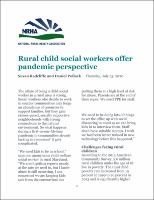Please use this identifier to cite or link to this item:
https://hdl.handle.net/20.500.12202/5832| Title: | Rural child social workers offer pandemic perspective. |
| Authors: | Pollack, Daniel Radcliffe, Susan 0000-0001-7323-6928 |
| Keywords: | rural health social work rural childfren COVID-19 pandemic rural social workers food insecurity internet access |
| Issue Date: | 23-Jul-2020 |
| Publisher: | National Rural Health Association (NRHA) |
| Citation: | Pollack, Daniel and Radcliffe, Susan. Rural child social workers offer pandemic perspective. Rural Health Voices Blog, July 23, 2020. |
| Series/Report no.: | Rural Health Voices Blog; |
| Abstract: | The allure of being a child social worker in a rural area is strong. Social workers who decide to work in smaller communities may forgo an abundance of resources to support families, but they gain slower-paced, socially supportive neighborhoods with strong connections to the natural environment. So what happens during a first-in-our-lifetime pandemic in communities already lacking in resources? It gets complicated. |
| Description: | Article |
| URI: | https://www.ruralhealthweb.org/blogs/ruralhealthvoices/july-2020/rural-child-social-workers-offer-pandemic-perspect https://hdl.handle.net/20.500.12202/5832 |
| Appears in Collections: | Wurzweiler School of Social Work: Faculty publications |
Files in This Item:
| File | Description | Size | Format | |
|---|---|---|---|---|
| Pollack Radcliffe art Rural child social workers offer pandemic perspective 7-23-20.pdf | 128.85 kB | Adobe PDF |  View/Open |
This item is licensed under a Creative Commons License

